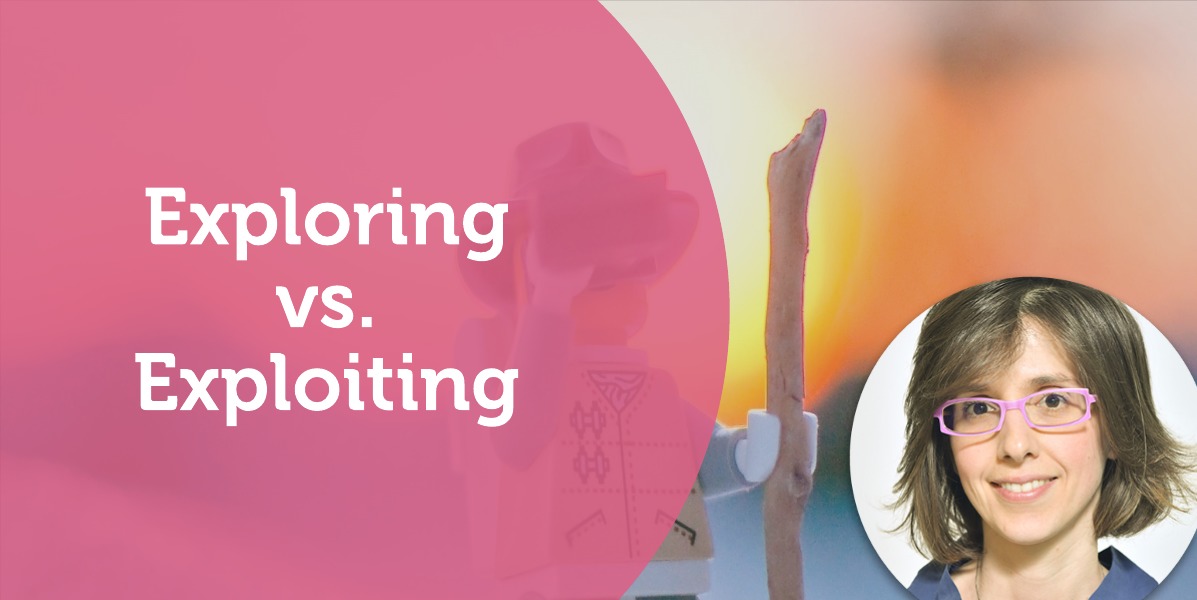 A Coaching Power Tool Created by Beatrice Manzoni
A Coaching Power Tool Created by Beatrice Manzoni
(Business Coach, ITALY)
Introduction
The power tool Exploring vs Exploitingis inspired by daily life. Daily, in our professional and personal life, we can make decisions and act in two different ways. In one way, we replicate what we have always done because we feel safer, we save time, we know what we are good at and we know that it works. In the second way, we explore new possible routes. While the first approach is easier and very often extremely efficient, the second one allows for changes in our life.
The first approach is not bad per se. On some routine decisions or decisions that are not so important to us, it can be the best approach because it allows us to save energy for those other decisions that are critical to us. However, that there are some situations or decisions where we feel a change is needed or would like to see a change happen, but we are still tempted to go for the status quo or replicate past behaviors. This happens because we are naturally resistant to change, even if we know that “what got you here won’t get you there”, quoting Marshall Goldsmith.
Explanation
Exploring about searching for new solutions and new possibilities. When we explore, we don’t take for granted past solutions, we challenge the status quo, we reject routine behaviors, we engage in divergent thinking, and we open up to new possibilities. In a sentence, we allow ourselves to craft a future that is different from the past. Most of the time for most of us, this is not the most frequent reaction to a situation, because it implies putting ourselves under discussion, doing something new, being uncertain about the results, and being open to failure.
Exploring can be associated with:
Exploiting about using known solutions and repeating what we already know and do. When we exploit, we engage in routine behaviors, we replicate effective past solutions, we quickly converge on the most obvious solutions, given that we know what our resources and capabilities are and we use them as much as possible. In a sentence, we follow the saying “never change a winning team”. Most of the times and for most of us, this is the most frequent approach to a situation, because it does not force ourselves to go out of the comfort zone, it is relatively automatic and absolutely efficient.
Exploiting can be associated with:
Application
Let’s think about John. He has been in his current role for ten years already. He masters his job really well; he is recognized by everyone inside his company as a great performer and subject expert. Headhunters often get in contact with him to offer him analogous roles in other companies. On the one side, he is happy with the situation because he easily reaches outstanding performance in his role, on the other side he dreams of new challenges and he complains about doing always the same things. One day he is offered a job rotation in a completely new role. He doesn’t know what to do. He can stay where he is, leveraging on his consolidated capabilities, with a job he knows, being sure he will keep on performing extraordinarily well. Alternatively, he can challenge himself, accepting a role he doesn’t know, and being unsure about how well he would perform and how much he would love it. He wants to change but staying where he is so much safer and easier.
How can support John in shifting from exploiting to exploring?
Reflection
References
Marshall Goldsmith (2010) What Got You Here Won’t Get You There: How successful people become even more successful, Profile Books.
Knut Haanaes (2015) Two reasons companies fail – and how to avoid them, TED Talk